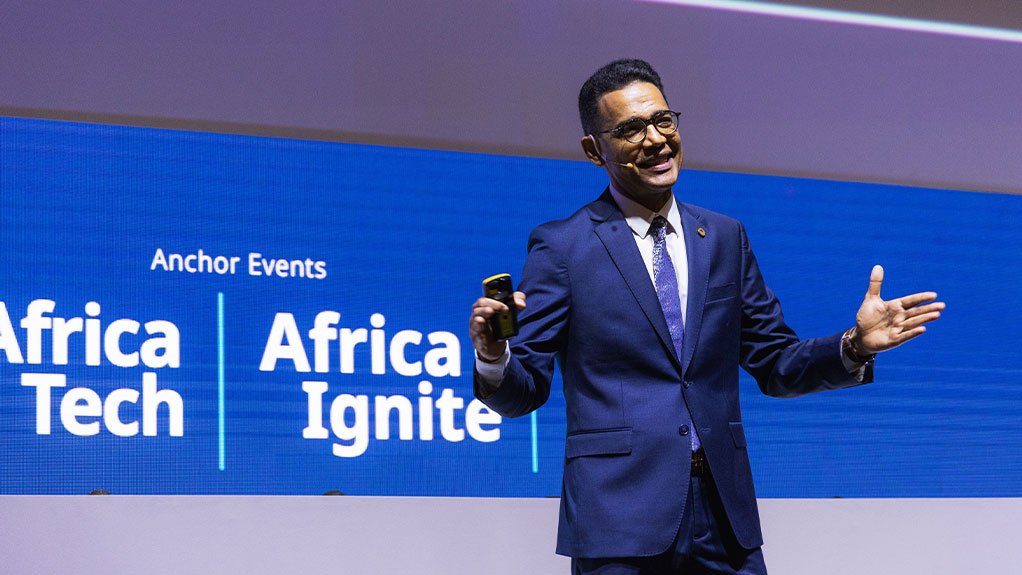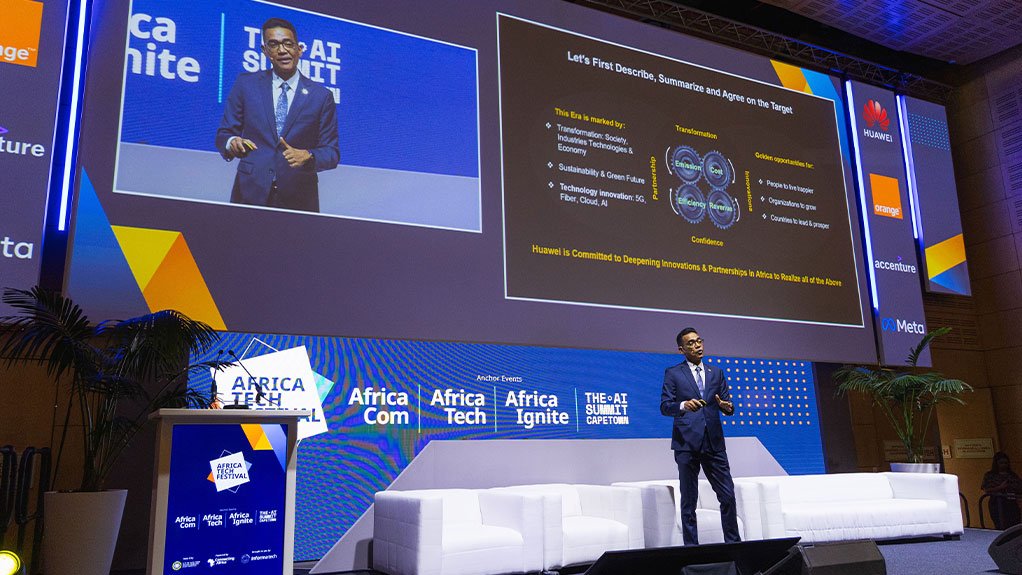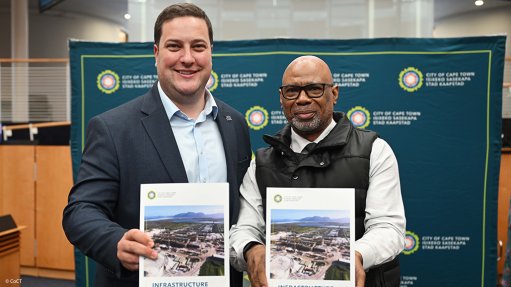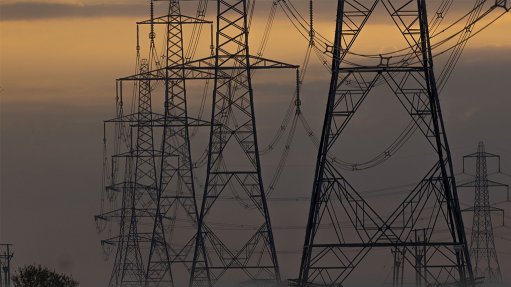Why empowering young minds is key to advancing the intelligent world
“Talent is the foundation for prosperity.” This is a key message delivered by Huawei Vice-President of ICT Strategy and Marketing Mohamed Madkour as he kicked off a lively lineup of speakers at the 2024 Africa Tech Festival, in Cape Town.
His address focused on the urgent need for intelligent connectivity and transformation as Africa grows its digital economy. “Africa has achieved a lot over the last decade, but we still need to work harder for Africa to leap in the era of 5G and intelligence,” Madkour opened. Two crucial trends will fuel this growth and help build a sustainable digital society, first industrialising information and communication technology (ICT) and also leveraging it in digitalising other industries. To achieve this transition Africa must focus on its services, infrastructure, talent and environment.
“At Huawei, beside diversified intelligent ICT infrastructure solutions offerings, we pay a lot of attention to talent, ecosystem, environment, as well as open partnerships and collaboration with all stake holders,” said Madkour. He added that about half of the devices being used to access the internet in sub-Saharan Africa are 2G or 3G phones. “We need to get that remarkable device, the smartphone, into the hands of every African person,” he advised.
The second trend that should ignite Africa’s digital transition is building up infrastructure to bring services closer to people. “More than 300-million people live 50 km or more away from the closest fibre or cable broadband connection,” said Madkour, stressing that, “home broadband needs a really big boost.”
These efforts will not just allow for more people on the continent to participate in the digital economy but it will go a long way to closing the digital divide and enabling sustainable futures.
Environment-friendly approach
Africa’s digital future must also be defined by new approaches to lowering environmental impacts created by ICT industries as well as using ICT to find solutions to global climate challenges. “Around 20% of the global carbon emissions can be cut by better usage of ICT. That's why we say these efforts don’t just make for a green ICT industry but, if done right, they will bring green operations to all industries,” remarked Madkour.
The communications and computing power that enables people to access the latest technologies, like artificial intelligence (AI), on their phones, uses up large amounts of energy resources causing further environmental strain. His message to the festival’s attendees was that innovative ways to power next-generation technologies like 5G and AI need to be uncovered so these developments do not come at the cost of the planet.
“When we talk about technology performance in Africa, we should couple that with power consumption efficiency. We should not only talk about sustainability for commercial purposes, but we also need to talk about sustainability for social purposes and prioritise the beauty of the environment in Africa.”
He expressed that Huawei’s strategy for sustainable digital development is to focus on the gains that can be made from these enhanced technologies and use them to unlock greener development.
He added that Huawei is supporting low-carbon transition initiatives on the continent as its leaders expand the power supply in their countries. Through its solar microgrids, Huawei aims to deliver power to rural and remote areas without needing large-scale investments in power distribution and transmission networks. Imagine a village of 150 households going from no power to receiving between 30 kW power and 60 kWh of energy storage system in three to six months – “that is crucial for closing the digital divide gap, that is what Huawei is aiming to deliver,” said Madkour.
Collaboration is the key to future development
No single organisation, government or operator can address these global challenges on its own, “it all requires real proactive collaboration for us to make a real difference,” he added. Huawei is laser-focused on developing talent through academic collaboration and certifications. The people trained today will do the crucial work of transforming how our society works and its ability to develop sustainably.
In closing off his address, Madkour told delegates that Huawei has been in Africa for more than a quarter of a century and that it is committed to the next era of close collaboration with leaders on the continent bringing better life for people, more productivity for organisations and prosperity to countries’ future.
For additional information please contact:
Vanashree Govender
Article Enquiry
Email Article
Save Article
Feedback
To advertise email advertising@creamermedia.co.za or click here
Announcements
What's On
Subscribe to improve your user experience...
Option 1 (equivalent of R125 a month):
Receive a weekly copy of Creamer Media's Engineering News & Mining Weekly magazine
(print copy for those in South Africa and e-magazine for those outside of South Africa)
Receive daily email newsletters
Access to full search results
Access archive of magazine back copies
Access to Projects in Progress
Access to ONE Research Report of your choice in PDF format
Option 2 (equivalent of R375 a month):
All benefits from Option 1
PLUS
Access to Creamer Media's Research Channel Africa for ALL Research Reports, in PDF format, on various industrial and mining sectors
including Electricity; Water; Energy Transition; Hydrogen; Roads, Rail and Ports; Coal; Gold; Platinum; Battery Metals; etc.
Already a subscriber?
Forgotten your password?
Receive weekly copy of Creamer Media's Engineering News & Mining Weekly magazine (print copy for those in South Africa and e-magazine for those outside of South Africa)
➕
Recieve daily email newsletters
➕
Access to full search results
➕
Access archive of magazine back copies
➕
Access to Projects in Progress
➕
Access to ONE Research Report of your choice in PDF format
RESEARCH CHANNEL AFRICA
R4500 (equivalent of R375 a month)
SUBSCRIBEAll benefits from Option 1
➕
Access to Creamer Media's Research Channel Africa for ALL Research Reports on various industrial and mining sectors, in PDF format, including on:
Electricity
➕
Water
➕
Energy Transition
➕
Hydrogen
➕
Roads, Rail and Ports
➕
Coal
➕
Gold
➕
Platinum
➕
Battery Metals
➕
etc.
Receive all benefits from Option 1 or Option 2 delivered to numerous people at your company
➕
Multiple User names and Passwords for simultaneous log-ins
➕
Intranet integration access to all in your organisation






















